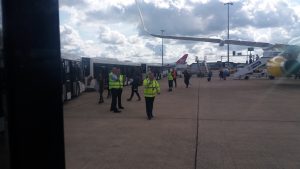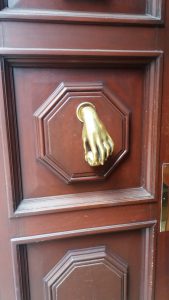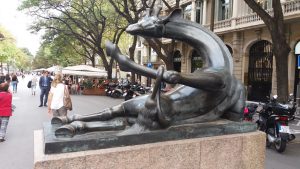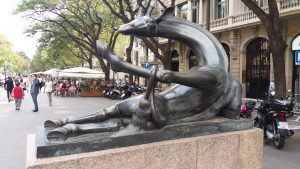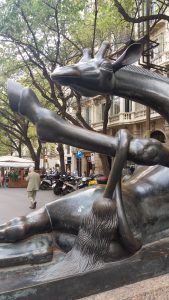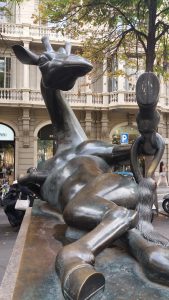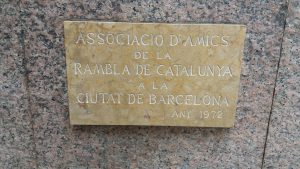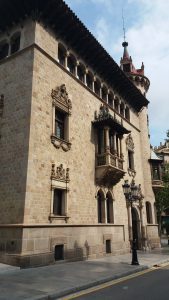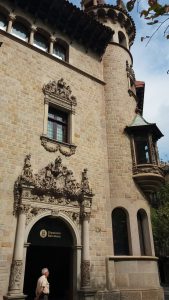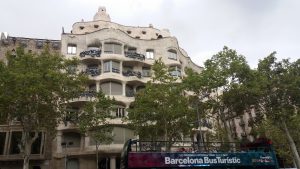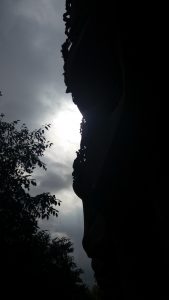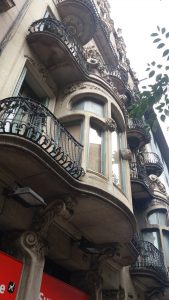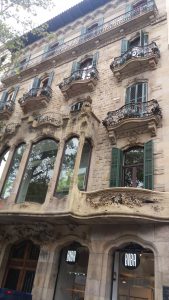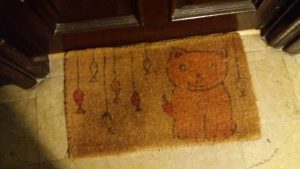I had a wonderful experience last night. “Don’t fence me in” is the title of a documentary film by Charles Maplestone, see page at Malachite Art Films. The British Library hosted a first public screening last night and early evening, in the hell of the London rush hours, I cycled across a drizzly and cold London from Roehampton to to the BL to get to the showing and was richly rewarded for my determination as the film is lovely.
The BL cinema isn’t huge but it was packed, I think there were probably 250 of us there but I was tired from my riding around and slumped near the front so perhaps I didn’t fully appreciate the size. I was struck, the second time this week, by how old most of my peers at something were: I saw two late teenagers and a few 20ish folks but at 60 I think I was around the lower quartile of the age range! I guess that makes sense as Fay Godwin was born in 1931 and died in 2005 and it felt as if many people who had come to the showing had known her and I guess she had an impact on many of us between about 1980 and her death 12 years ago. I first bought one of her books (Islands with text by John Fowles) back in 1980 and I’m amused to see that the book was only two years old when I did. Watching the film last night, so many of her photographs were immediately familiar to me and I’m intrigued, on searching my shelves quickly, to find that I don’t seem to own any more of her books (shame on me). Similarly, thinking through the exhibitions that were noted in the film and show up in internet references I can find, I don’t think I went to any of them (more shame). So how is her work so familiar to me?
I think she has had a lot of publication in collected exhibitions perhaps but I’m a bit at a loss to answer my own question there and determined now never to miss any retrospective exhibitions that come up and to start collecting her books where I can afford them (apparently first editions of Remains of Elmet: A Pennine Sequence, which she did with Ted Hughes are now very costly collectors’ pieces so I can forget that!) However, I think it may be that her work speaks so deeply to things I believe in that every image of hers I see, perhaps even when I may not have known it was hers, burns deep into my visual memory.
If you don’t know her work then I think the best way to get a sense of it is to go to the BL’s archive of her work That gives a sense of her genius with both people and places. It doesn’t (yet) appear to make available her later colour prints which were almost absract (and which I hadn’t encountered before last night). I wouldn’t bother clicking on the images there to enlarge them as they’re all stamped across the enlargements with three copies of a BL copyright statement. I think she might have had very mixed feelings about that.
There are two layers to my deep, gut/bone pleasure in having seen the film (and having bought a couple of copies!) One I think is that she was simply a genius with cameras and, unusually I think, both with portraits and with the landscapes. I think her landscapes are portraits too, portraits of land and the makeup artists who ever lived in/on it and impinged on it. All that is dear to me and captures images that seem to me to be particularly important to capture. However, watching last night I realised that the other issue is in the title: “Don’t fence me in”, and how much that imperative, let’s give it its proper punctuation: “Don’t fence me in!” matters increasingly to me.
Let’s start with the imagery and its genius. One theme in the film, and coming across well in the interviews with her, and filming of her giving interviews and seminars, was that she came into photography from family snapshots. There is that that simple intimacy in most of her work that is there in good family ‘photos: the photographer and subject are known to each other, there is trust and no worries about audience or property rights intrude on the recording.
I think that same intimacy is there in her portraiture but even in her most stark photos of the most barren bits of the UK: these places are family to her. Another aspect of what makes her special is that she was interested in how photos stood in relation to one another and in relation to words and to ideas. She was more a book and exhibition photographer than a single shot photo-reporter or all that her portraiture started in that single shot tradition. As she gained confidence (I suspect) she created ways to work closely with writers and poets on the books she did, and she had the ability to wait and wait and wait to get the right image, with the right implicit stories for the viewers to take from it. (She would wait for months as she describes for one glorious shot of a copper beech tree, completely naked in the depths of winter and reflected in the water below it, or again as she described for another photo of the white cliffs of Dover made completely white: utterly smothered in snow).
I feel she waited for the light and detail to be right as we might wait for the right tone, accent and staging for a really good Shakespeare play or any classic that can have multiple incarnations. As we might wait for someone to read a poem in way that really does it justice. There was a splendid short sequence in the film as the camera moves around a photo of hers (almost spuriously) where the sound track is someone, I am guessing Ted Hughes himself, someone with a glorious northern accent, reading the poem that goes with the photo in their book. The poem is brilliant to start with, but spoken so well, in that voice, it sort of washes over you and hammers you in a way that I reading it, silently or aloud to myself, could simply never capture. The poem is short, one verse, a minute in the film, but I’m reminded of the experience of being part of a landscape as a storm batters over everything in sight. The storm, like that voice, hammers home an experiential moment into a sort of wedding: you now take each other, for ever, well, ’til death does wrench you off the globe; you will never exactly be the same again, and that setting won’t either, it will always remain enhanced in your memory by the whole experience.
So many of the places and people she took were intrinsically striking, “photogenic”, deserving memorialisation of each moment, but when Fay Godwin got the right moment, the right angle, the right focus, frame, contrast, they are celebrated, not just captured. That’s genius and one particular theme in the film was that she recognised that the scenery of the UK that she caught is human scenery, as much shaped by from decades to millenia of human impacts and co-dependency, as her ‘photo is shaped by her particular choices with the camera (and the subsequent selection of the one negative to print, she took a very high number of negatives for any one print she used) and her choices in the dark room (or later on the digital image handling software and digital printer, even though she seems never to have given up starting from film). There’s something there about the respect for our, sometimes puny, sometimes horrifically brutal, impacts on our countryside: even if there’s no animal more human than a sheep in her ‘photo, the shadows of humans in the walls, tracks, just the shaping of the land, are always there.
There’s a remarkable mix of the lonely and isolated aspects of human existence against the universal and ecological in all that.
So that’s my attempt to catch something of how the ‘photos move me and stay with me. Now what about “Don’t fence me in!” Fay Godwin became president of the Ramblers’ Association (1987-1990) and is clearly credited with having done much to help campaigns that led to “right to roam” legislation. Another of her books I thought I had was Our Forbidden Land (1990) which is a superb invective against how much of the UK is in private hands, particularly in the hands of our military and our hereditarily wealthy. Our “rights to roam” and any real equity of access have a long way still to go, nearly 40 years on the fight against excluding land ownership. Take last year’s example: Donald Trump’s Scottish golf course destroying sites of special scientific interest. I think Fay Godwin’s passion, though focused on the land, was also about every attempt to fence in people’s thinking, she resonates with writers who don’t want to be told what to think and who invite their readers to roam with them (or to reject that invitation).
This burns with me though I guess cognitively rather than simply perceptually, expertientially. Why do so many of us appear to want to be told what to think? I think we need people like her, and so many of the brilliant writers she caught, to remind us that dry stone walls, even some fences, are certainly vital to live well with other animals and each other, but to remind us of the need for styles, gates, rights of way. This was, and is, as true for the maps and places of the mind as it is for the those of the land. We should all fight for is the right to think for ourselves. I don’t believe in fighting for it to the point where we start killing each other, arguing lightly that our freedom to think gives us the right to kill others is to fundamentally abuse the real issue. However, I’m damn sure we need to fight with words for our freedom for all our ideas to roam, to roam anywhere as long as it’s not simply in order to impinge on another’s thoughts. There’s a profound differences between the freedom of pacifist anarchism and equity from the “freedom” words of neo-liberals who really just want to fence others in and protect their own wealth and diktats.
Thank you Fay Godwin for so much beauty and passion, and thanks to the people who made the film, and made its showing last night happen.
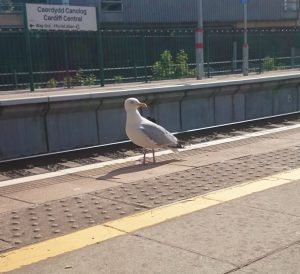
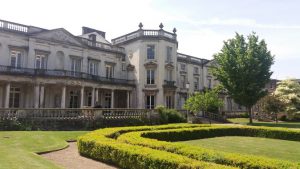

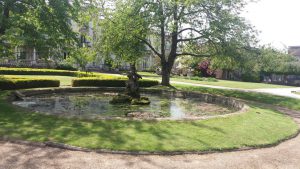
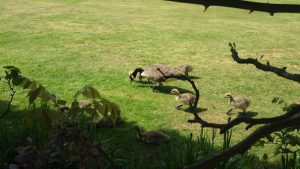
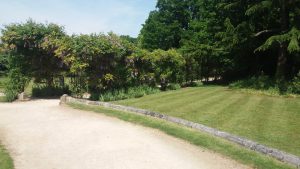

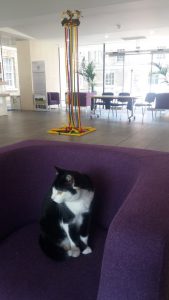
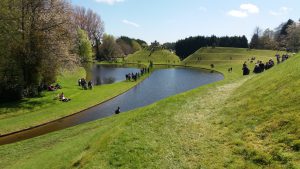

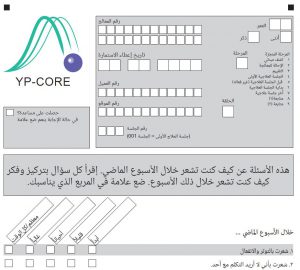
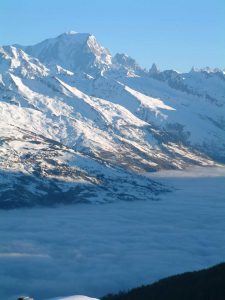
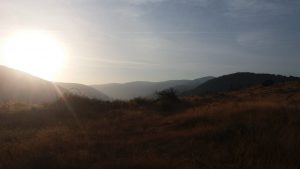 Spanish hills/mountains in the early morning sun 7/9/16!
Spanish hills/mountains in the early morning sun 7/9/16!
